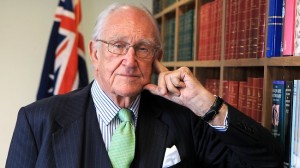Covenant of ethics the key to peace
 Former Australian Prime Minister and human rights advocate Malcolm Fraser has called for the establishment of an international ‘covenant of human ethics’.
Former Australian Prime Minister and human rights advocate Malcolm Fraser has called for the establishment of an international ‘covenant of human ethics’.
In a speech to the InterAction Council interfaith dialogue meeting in Vienna last month, Mr Fraser said: “There is a common ethic running through the world’s major religions. The basic values needed for a just society are shared, and their acceptance may be a prerequisite for a peaceful world”.
He said there were many factors which made the issue of human ethics more important than ever before.
“One of them is the rapid growth in the world’s population. At the time of the First World War, the world population was 1.7bn. At the end of the Second World War it was 2.3bn. Today, it has reached 7.2bn and is continuing to increase at a rapid rate. This growth will make it more urgent to use the planet’s resources wisely, and to pay proper attention to environmental issues,” Mr Fraser said.
He said foreign policy was another factor.
“During the cold war, the world was more stable; there was less danger of serious armed conflict then than is now the case. The fact that there were two superpowers led to a certain precarious balance. Each knew that they could not push the other too hard, and neither wanted a nuclear war (though they came frighteningly close on repeated occasions). That balance ended in 1991 with the break-up of the Soviet Union,” he said.
“Since that time, and despite the non-proliferation treaty, more countries (currently nine), now possess nuclear weapons. The danger of such weapons falling into the wrong hands is real, and the possibility of a regional nuclear war cannot be dismissed as idle speculation.
“We all understand that such a conflict could have severe global consequences for the environment and for future security, with billions at risk of famine,” Mr Fraser said.
He said the acceptance of a common set of ethics, within and between religions and nation states was important to achieving a more just and peaceful world.
Mr Fraser said problems faced by humanity are much more urgent than in previous times.
“Humankind has two separate means of destroying life on this planet,” he said.
“The first is the inadequacy of the non-proliferation treaty, the failure of nuclear-armed states to disarm as the treaty obligates them to do, the widening capacity to produce fissile materials usable for nuclear weapons, the continuation of two thousand weapons being on high alert, makes the possibility of some nuclear conflict more likely than before.
“Secondly, failure to act on environmental issues could also destroy the planet. Those of us who lead comfortable lives might find it difficult to appreciate or understand the urgency, but the urgency grows as each year passes without effective and adequate action,” Mr Fraser said.
He identified key issues that need attention now.
“The non-proliferation treaty has been applied inequitably. Actions are permitted by those who are regarded as friends. Similar actions are denied to others. The non-proliferation treaty requires urgent renewal. There is a considerable body of opinion amongst former military and former secretaries of defence, led by George Schultz and former secretary of state, Henry Kissinger… that nuclear weapons are not necessary for the safety of any country, while endangering all. Therefore, they ought to be abolished.” Mr Fraser said.
“More than 40 countries have the capacity to build a nuclear bomb. There are a few countries which could have nuclear weapons on deliverable missiles within months. This makes the danger of nuclear conflict, or of terrorists gaining possession of a nuclear weapon, greater than ever before.
“A binding international agreement to prohibit and eradicate nuclear weapons is needed, and all states have some capacity and bear responsibility to begin negotiations on such an agreement as a matter of urgent priority.
“We also have the capacity to do grave and serious damage to the planet through global warming. These factors are a new phenomenon in the history of the human race. How do we find the way forward? How do we unlock the will and the conviction to take necessary action?
“These issues will not be tackled unless there is a change of attitude, where less emphasis is placed on short-term self-interest and more emphasis is given to ethical, long-term decision making by governments,” Mr Fraser said.












